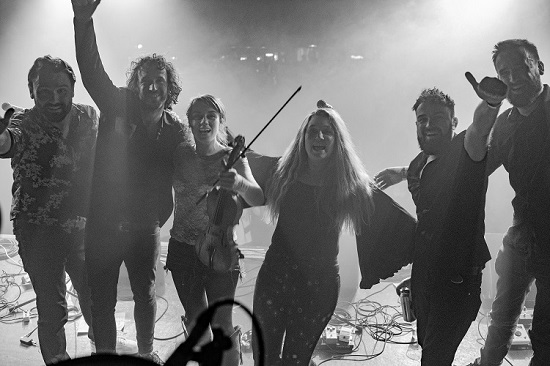
We like to try something different now and again. It’s the challenge. Allan, as we probably know likes a challenge, which gig photography always provides. This year, as new connections have been made with artists and managers, opportunities have come up to try a few other things away from stage performance. And why not? Over to Allan.
Eleni (Echo Wants her Voice Back) Camden Chapel soundcheck
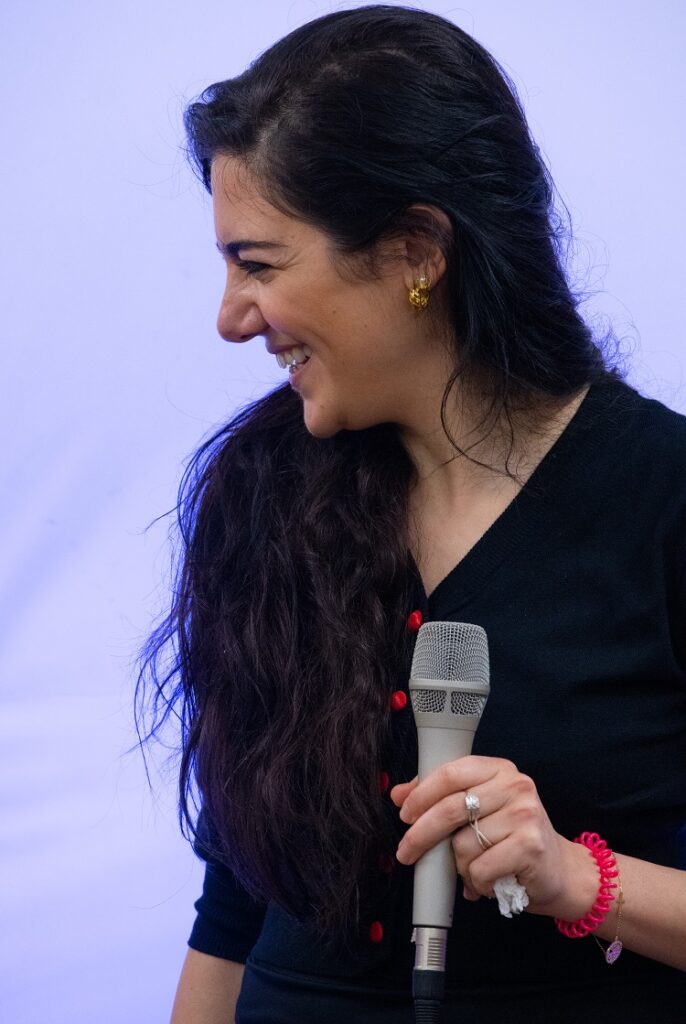
I’ve photographed Eleni a few times over the last few years and she’s a joy to shoot. Her face is always animated and her wardrobe is always striking. And the music – it’s a mixture of pop, r’n’b and Hellenic Noir and it’s very dramatic. Add to that Eleni’s striking and powerful voice and some unusual arrangements and you have a potent mix. When she played the intimate Talentbanq venue The Camden Chapel in January this year, I turned up for the soundcheck to grab a few shots in a fairly relaxed environment. Even at a soundcheck, Eleni’s still a performer.
Nicky (Morganway) 229 Soundcheck
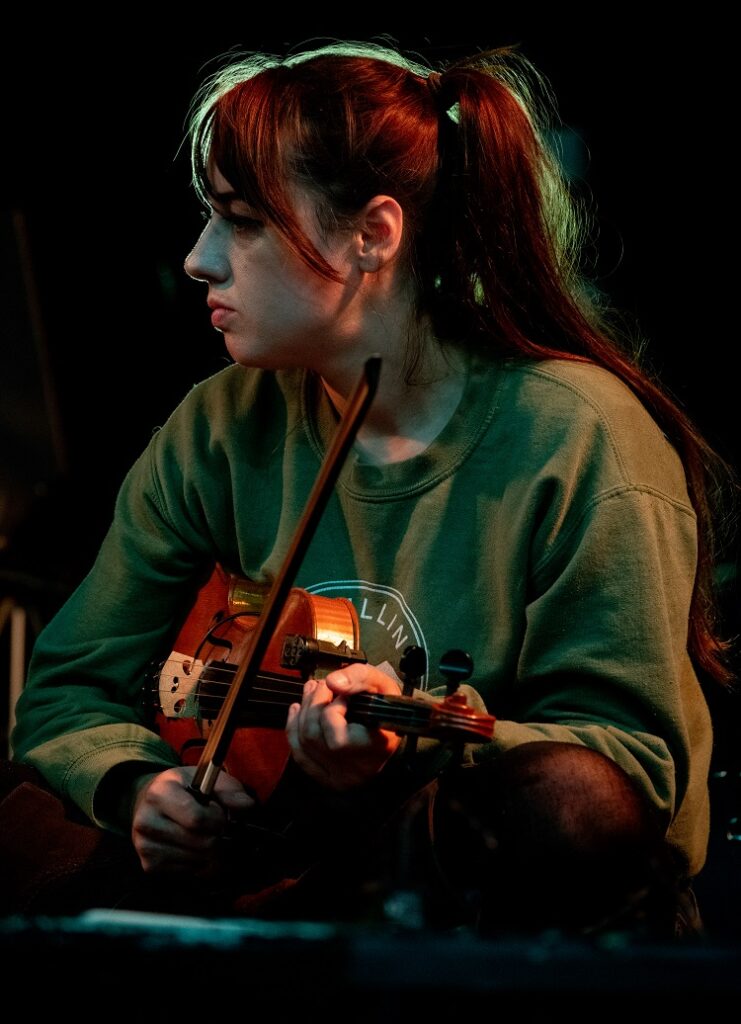
Another Talentbanq gig at a slightly bigger venue than The Chapel. This one was a celebration of Talentbanq’s fifth birthday and Morganway, one of my favourite bands, was playing so it was an opportunity for a catch-up and another chance to shoot an incredibly dynamic band in action. Soundchecks, apart from the full band run-through, can be a bit tedious for band and onlookers alike but there can be some gold there if you keep looking for it. Nicky (Nicole J Terry) is Morganway’s violinist (or fiddle player, however you call it). On stage she’s a bundle of pure energy, playing, singing and dancing as if her life depended on it. After doing a quick line check for her violin and vocals, Nicky took an opportunity to relax as the stage light were being set up. She was completely relaxed, which would have made a nice photo, but I was able to line the shot up with a light shining from directly behind, which really made it ping.
The Slacksons, Hanwell Hootie post-gig
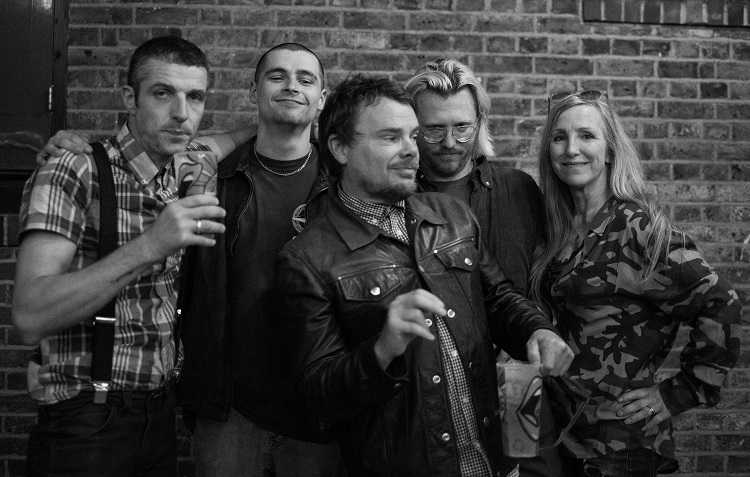
I’ve shot The Slacksons a few times now as well. Their crowd-pleasing blend of samples and live instruments with Mikey and Andy out front pinballing around the stage make them a great live attraction. I first met the band through one of those weird music business coincidences – their manager has the same name as my sister, so obviously when we connected on social media, I thought my sister’s account had been hacked. So I ended up shooting a few of the band’s gigs including their appearance at he Hanwell Hootie this summer. We decided to do some post-gig pictures which involved about two minutes shooting and forty-five minutes rounding up the band. I liked this shot with their manager making an appearance as well.
Kat ‘Liar, Liar’ video shoot
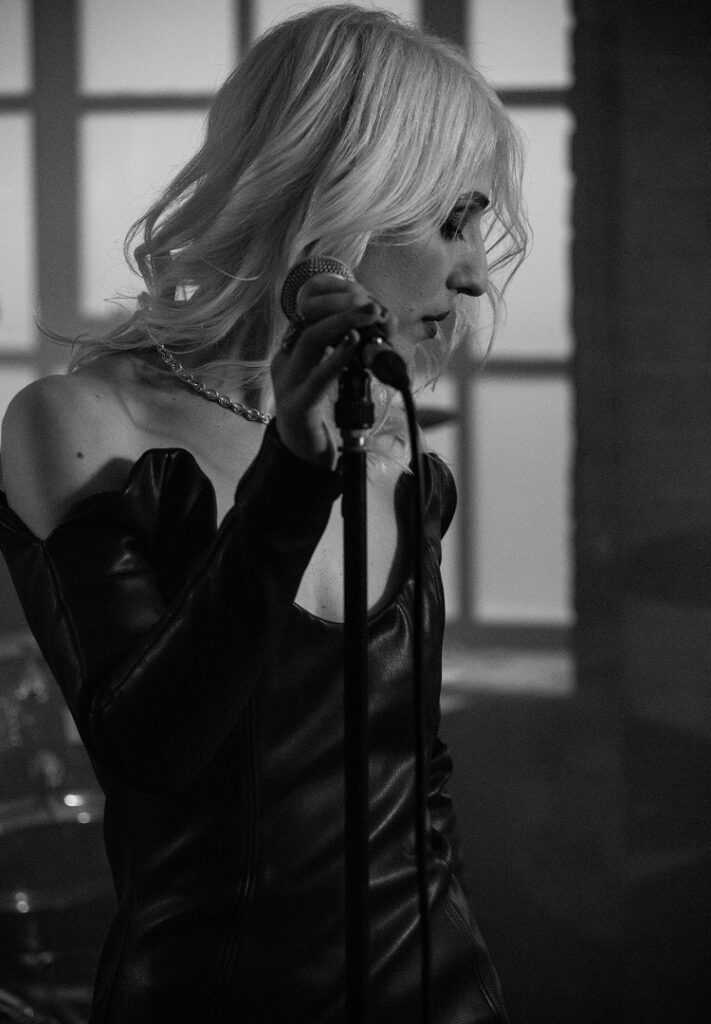
Kat, like Eleni, is a singer-songwriter and actor (also a radio presenter). I’ve shot a few of her gigs and got an invite to do some behind-the-scenes photos at the shoot for the video of her single ‘Liar, Liar’ in April. Not something I’d done before but I’m always ready to take on something new. If I’m honest, it’s a bit like a soundcheck, you just keep your eyes open for anything interesting, keep out of shot and don’t cast any shadows on the shot. Kat’s another person I love to photograph, mainly because the results are always good. You can probably see what I mean.
Lyndon Morgans & Phil Burdett, St Pancras Old Church
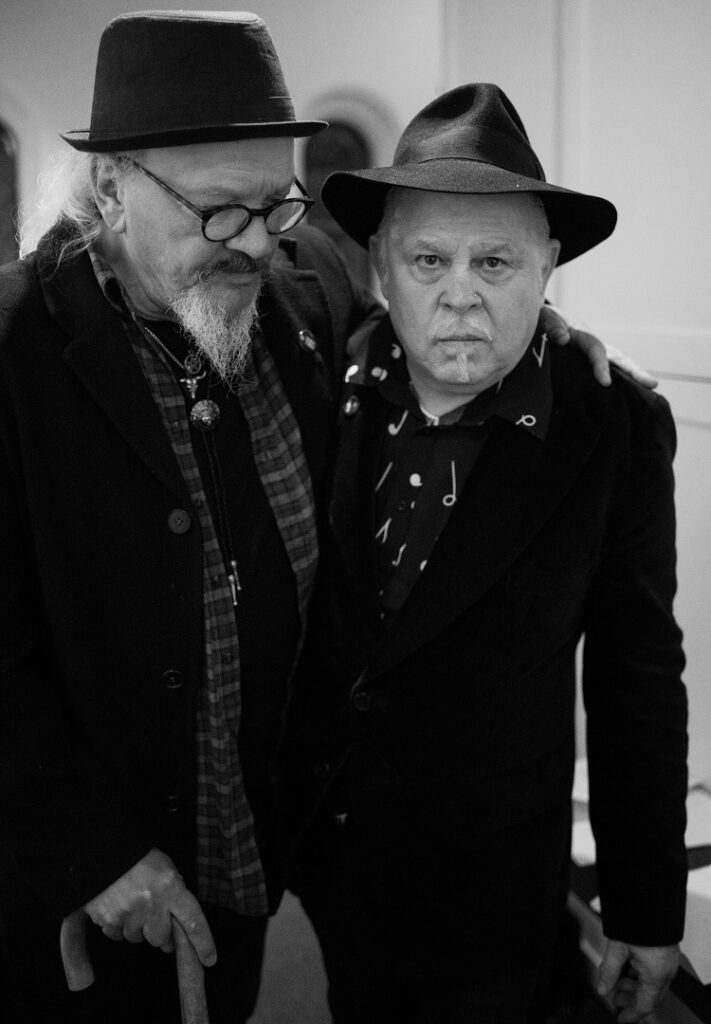
Bit of a change of style here. I’ve known Phil for a few years now and he introduced me to Lyndon (Songdog) just before the plague. When I heard about this gig I was really pleased because I haven’t shot Lyndon before. Only one problem, I already had gig that night, shooting Stone Foundation and Graham Parker at Koko. Fortunately the two venues are only a few minutes apart and the Stone Foundation gig had an early curfew so I had a swift walk over to SPOC to catch the end of Lyndon’s set. We went back to The Green Room to speak to Lyndon and the obvious photo opportunity came up. Here’s one of the results.
A couple of bonuses
Here’s a couple that are almost gig photos. After Kat’s launch party for the ‘Liar,Liar’ gig at Piano, the band was so up that I had to try to capture the moment. The Morganway shot, from the same gig as the earlier shot of Nicky was planned in advance because I’d always wanted to take one of those shots at the end of a gig from the drum riser. The lighting wasn’t ideal and there was too much smoke bit I still like the moment the photo captures.
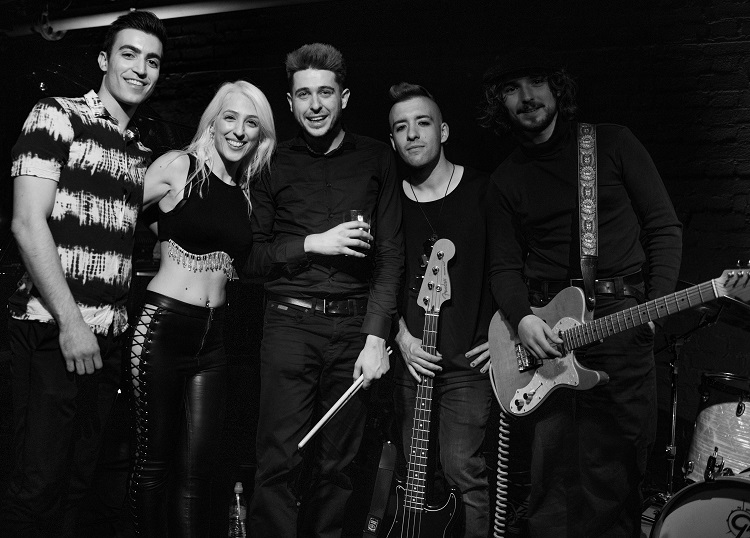
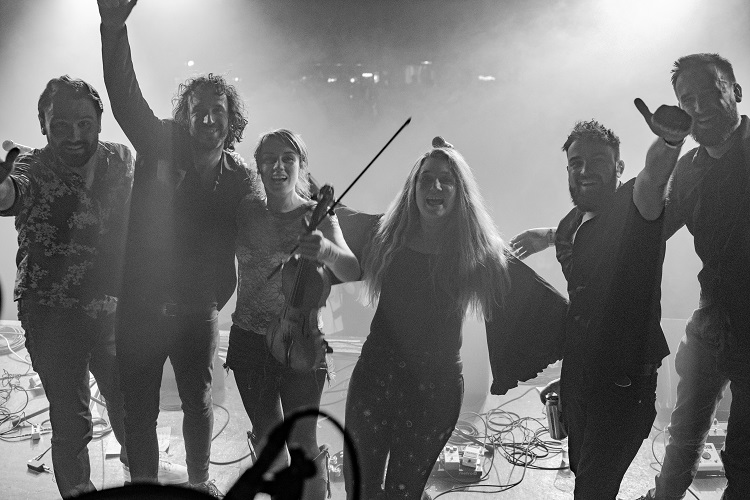
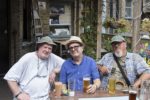
John Bulley, Steve Stott & Phil Burdett
When I get a message inviting me to visit the Railway in Southend to interview Phil Burdett, there’s only one possible response – when do I have to get there? Well, it was a mid-July Friday afternoon and the interview was livened up by the presence of Steve Stott, superb fiddle and mandolin player with Phil’s ever-evolving band. As always where Phil Burdett’s involved, it was interesting and sometimes controversial. I’ve left out some stuff to protect the innocent and the guilty – sorry Phil. Anyway, here’s how it went.
Allan – To start on familiar territory, with the last album, “Psychopastoral”, the thing that immediately struck me was releasing it as one continuous track, which gets round the whole iTunes download thing about single tracks or whole albums.
Phil – I’m sure they’re quaking in their boots at iTunes, it is a little victory but it’s the best I can hope for these days; Pyrrhic victories. I crave more Pyrrhic victories.
Allan – It took me a while to get this while I listened to it on my trusty old media player on continuous cycle as it went from the end straight back to the beginning, that the album was a cycle from the early morning to early morning a day later. I said at the time that I thought it was an outstanding piece of work, as good as anything you’ve done, I think.
Phil – I must admit, I was surprised, in the sense that it was different from what I used to do and I thought I’m either going to get some new people who like it and hate everything I’ve ever done or just everyone will hate it. You get so involved with it and you think you’re creating Wagner’s “Ring Cycle” and someone tells you ‘This doesn’t make any sense at all. What are you doing? You’ve lost your mind.’ It was pleasing that some people that liked what I do liked it and also some people some that haven’t particularly liked what I’ve done before seem to like it as well.
Steve – There’s probably some of the style that you used to do still remaining but combined with what you’re feeling now, so it covers both ends.
Phil – It’s like Tom Waits, but not quite such a radical change (that’s the next album). He lost a lot of his old fans who said ‘I liked him when he was drunk and living in a dodgy hotel and being a sort of dharma bum’, but you get bored with it. You can come up with many artistic reasons ‘I decided to embrace the idea of a concept album, in my late fifties…’, but basically you’re bored and I couldn’t get into music after the operation and the stuff I went through there. I started playing and did a couple of gigs and I felt like a Phil Burdett tribute act and I thought ‘What am I doing this for? I’m trying to write more songs like this.’ If you’re trying to write something don’t do it. So I thought let’s do something I can’t do, so we’re doing a film now.
I’ve got to do a film soundtrack; there will be songs, and that’s made me and write the songs because I think I need a song here to go over this bit of film.
Steve – There are some great songs, actually, from the demos I’ve heard.
Phil – Thank you. I hope you’ve got that on tape.
Allan – When we were chatting earlier, you were saying something the film being a bridge between “Psychopastoral” and the next album.
Phil – It is; there’s a lot of stuff I wrote in the hospital; morphine is a wonderful thing. I read it back when I sobered up and I thought I have no idea what this man is talking about, then it started making sense gradually and I realised that a lot of it followed on from what I did on the last album but I didn’t want it to be the middle album before I get really depressing with the hospital songs. I thought it wold be nice if it had some other element to it, so I thought ‘Let’s make a film!’ And directly, I thought there was no way I could make a film with on no money, no budget and no actors
Steve – Not strictly true…
Phil – So we are, and the fact that it’s actually happening is what’s keeping me going because even the prospect of doing the bunch of songs I had written felt like ‘Here we go again’ but this will spark it off and it’s also got a visual element to it, which I like the idea of. It’s not a series of music videos joined together, but you know The The did that film, I want it to have that sort of feel to it, but there’s a bit more drama involved (with a small d). We’re not talking “Apocalypse Now”, we couldn’t afford the helicopters…
Allan – And this is not the only film you’ve been involved with recently, is it?
Phil – No, I’m a regular luvvie now. ‘Just in between films, dahling’. It’s a documentary about growing up in Basildon. It was initially about brutalist architecture but it seemed to evolve when the director met a lot of artists from Basildon and they were all so different but they all had a similar theme of a love/hate relationship with Basildon so it was about that; it was good fun. He let me witter on then edited it down to something that was almost coherent, so I was quite pleased with that.
Steve – The people the film’s about, or featured in the film, have all left Basildon, haven’t they? There’s not a single one actually lives in Basildon now.
Phil – Which was hilarious. A lot of the Irish diaspora sing “From Clare to Here” and “Off to Dublin in the Green” but they’re all in Finsbury Park now. ‘We all love it but we’re not going back there. Fuck that.’
Allan – As an ex-pat Scot I completely get that. So, without giving too much away in terms of plot, what’s the story with the film?
Phil – Well the “Psychopastoral” album was basically, the narrative throughout was called ‘the long walk home’ and it’s an idea that I’ve discovered that many of the people I like, in music and literature and poetry, were always disappearing into the wilderness looking for something and what they were looking for was somewhere they could go home and that was the vague idea. A lot of them went to nature; it was based around William Blake, John Clare and Arthur Rimbaud. They all disappeared to derange their senses and they all found out they were miles from home: ‘I don’t feel at home and that’s what I wanted in the first place. I wanted to feel something.’ That’s the idea of that album and going through my traumas, I thought ‘They were all walking’.
John Clare famously walked from High Beach to Helpston; he walked from this lunatic asylum, going home to what he thought was his wife, but was actually his mistress, who had actually died anyway so it was an exercise in the definition of futility. I used him as the central character and Blake was another one who didn’t actually wander, but he wandered in his head. He was seeking angels in the trees; he was a cockney mystic, like the Russell Brand of his day. They were people who had ideas beyond their station and then realised that they wanted to get back to their station. It was the idea of comfort without being comfortable and when you derange your senses there is a sense that nothing makes sense and that can be liberating but, after a while, it becomes just derangement.
Rimbaud gave up altogether and became a gun-runner, Blake started to write about Heaven-knows-what and Clare lost his mind. He thought he was Shakespeare, he thought he was a boxer at one point. So I thought the halfway house of madness is fine because you get the little insights. When that’s happening, that’s great, but once you’re in an asylum and you’re thinking you’re Shakespeare, that’s really not useful as an artist.
Brian Wilson’s an example. Everyone thought ‘How on earth did he write “Good Vibrations”?’ Look at the stuff he wrote once he reached his destination and it’s like a five-year-old writing; wonderfully produced and interesting, but still like a five-year-old. I wanted to avoid that, so while I was in the hospital I wrote all this really depressing stuff because I thought everything was coming to an end but when I came out, I thought it’s not coming to an end but I couldn’t think in the same way as I did.
I thought it was a continuation. I’d lost a leg; Rimbaud lost a leg; Captain Ahab lost a leg searching for something and I grabbed the idea of the long walk home without a leg. That’s basically what this is all about. The further out you get, through drink, drugs, mysticism, anything, the less able you are to communicate it to people because they just think you’ve gone mad. But there’s a point just before it ends, before you do go mad, where it’s really interesting and that’s point I’m trying to hold on to in this film. And then it descends into depression and madness which is what the really interesting third album of the trilogy is about, but we’ll get to that later. I want to make it sound like Steely Dan actually because that’s the only way it’s gonna sell anything, either that or “Berlin” by Lou Reed, which I love, but it’s unlistenable to most people. This will make “Berlin” sound like Five Star
Allan– Looking beyond that, have you got any more plans for live stuff coming up?
Phil – It’s a bit tricky. I’ve lost all my mojo, although I don’t know what a Mojo is apart from a middle-class magazine for people who still like Crosby, Stills and Nash, but I don’t know. I’d like to do it but I want to have a point to it. It’s the same way I feel about the writing; I don’t want to do all this differently and feel I’ve changed my approach and then think ‘Oh, we’ll go and do some gigs’.
I’m having some poetry published at the end of the year and I’d like to include some of that in it because there’s a lot more poetry on the album. I wouldn’t mind dipping my toe in the water by doing stuff with Steve. We did a thing in a church, didn’t we?
Steve – Yeah, St Paul’s church. That was beautiful actually; it was purely acoustic, just a selection of songs that suited the venue. I suppose it was a kind of folky thing.
Phil – It was. I’d like to do that with some poetry, just to see if I can read the poetry. There’s a couple of poetry evenings here where you can just get up and read.
Steve – I think the other thing is to enjoy doing it rather than have the pressure of putting on a big gig and inviting lots of people.
Phil – When we planned to do the album launch gig, I got to the rehearsal and then thought ‘What the fuck am I doing?’. If it had all been rehearsed without me there, I might have been able to turn up and sing it but I was just sitting there thinking that I wanted to do something else, I didn’t want to be sitting there churning out this stuff. It felt it important that the whole process changed, and what I don’t want to do is just get back to ‘let’s do a gig then. All the creativity has stopped, let’s go and regurgitate it live with some feedback.’
Steve – We were doing gigs to promote the albums that we all produced, so the was the reason for the gigs.
Phil – And that’s why they’re all platinum sellers…
Steve – So the question is, do we really need to do that?
Phil – The Leigh Folk Festival, I’d like to do something there next year; not just for ‘Oh, Phil’s singing again and he’s got one leg. Oh, well done, Phil.’ Unless I have my head chopped off, I can fuckin’ sing; Ella Fitzgerald managed and I’m a better singer than she is. (Followed by a loud cackle).
Allan – I suppose the thing is, whatever you decide to do, you’ve got a great bunch of musicians working with you.
Phil – I have, just don’t tell my band. No, it’s true; I’m really appreciative of the musicians I’ve been able to talk into doing stuff for nothing because it would have been very difficult otherwise. I don’t like having a regular band. I used to but now I feel like everything we do something it’s a new band almost because we evolve with this particular bunch, except the drummers…
Allan – That’s all a bit Spinal Tap isn’t it?
Steve – I don’t even know if I’ll be on the next album…
Phil – You are, but you’re playing drums. Just don’t get the drummer’s job, because then you know you’re out. No, it is a bit Spinal Tap with the drummers. The last one did actually spontaneously combust.
Allan – I suppose, Steve, you’ve got double the chance of staying in the band, playing two instruments.
Phil – He sneaks in with a false nose and moustache. ’I’ve found a new fiddle player – fuck it’s Stott’
Steve – I try to make myself as indispensable as possible.
Phil – He does; he’s currently learning the oboe. It’s great; I’m getting in touch now because I’ve got these demos for the soundtrack of the film, so I’m going to send them the stuff and we’ll get together at some point and we’ll go and record. We’ll record it at Senor Al’s (Al Franklinos) because it’s my favourite place at the moment.
Steve – It ties in very nicely with “Psychopastoral” because of the park…
Phil – Well, the songs are very different from “Psychopastoral”, so I would like it to have some continuity and that will come from whatever Al does.
Steve – And it’s the location in Peckham, where Blake’s tree is, so there’s a catharsis there.
Phil – I’d like to point out that he used the word catharsis there. Always avoid the words journey and catharsis.
Allan – And what about some of the other collaborators on “Psychopastoral”?
Phil – One of the linking voices throughout this three-album thing will be Lyndon Morgans (Songdog) who did the narration for the album (“Psychopastoral”) and he’s going to do the narration for the film, the subsequent album and the album after that, so I’m really pleased about that. He’s an old Welsh wanderer, a Celtic wanderer and I need his Richard Burton-like authority. I’ll be making him read stuff he doesn’t understand for the next two albums.
Allan – I must admit, those links on “Psychopastoral” worked really well. His voice is fabulous for those.
Phil – It was the thing I was worried about because it was the thing that was going to make it different in a way and with my zero knowledge of arrangement of the quasi-classical stuff that’s going on in the background, it was either going to be great or it was going to be shit; there is no middle-ground. And it was almost great…
Allan – And is there anything else to throw in before we wrap it up?
Phil – There’s my collection of reggae covers… I’m looking forward, in a way, to finishing this trilogy because I don’t know what I’m going to do after that, and I never felt like that. It was always just ‘Here’s another bunch of songs that I like, I’ll record them with musicians I like and we’ll put it out and some people will like it and some won’t and then we’ll do the Leigh Folk Festival, then we’ll do this, then we’ll play The Railway’. That’s not going to happen, so I’m really interested in what I want to do after that.
Steve – I think we ought to base that on whatever the outcome of the film is. You might want to do another film.
Phil – I’d love to. I’m not sure anyone else will; I’m putting many people in to therapy with this film but that would be great. But then again, I might just think ‘I’ve done that’. I won’t do it just because I’ve made a film and invent some spurious half-arsed concept…
Steve – I was just trying to generate some work for myself…
Phil – I know you were. Talking of which, there’s a collection of folk-based songs that I want to record, so I might do that as a little side project with some real folk musicians. Radical concept, I know. It’s simple; you don’t rehearse, you just have to sober them up. That’s something I wouldn’t mind doing as a side project; it’ll be nice, it’ll be my stardust memory. It was so much better when we wrote songs…
And that was where I switched off the recorder before the descent into totally scurrilous alcohol-fuelled conversation. The Basildon film that Phil refers to is ”New Town Utopia” and it’s a fascinating exploration of the development of the town and its impact on the creative artists living there. You really should watch it.
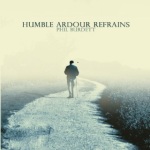 A long time ago, I really struggled with the musical concept that the most important thing wasn’t the notes, but the space between the notes. I was a bit literal and musically unsophisticated at that time, but I managed to get my head around the idea before it got me into any arguments. The reason I’m inviting you to have a laugh at my expense here is that Phil Burdett’s album “Humble Ardour Refrains” has some wonderful examples of using the space between the notes to create atmosphere and emotion. This is one of two albums that Phil’s releasing simultaneously on Drumfire Records (you can read about “Shaky Path to Arcadia” here) and if you take the two albums together, it’s an extraordinary achievement.
A long time ago, I really struggled with the musical concept that the most important thing wasn’t the notes, but the space between the notes. I was a bit literal and musically unsophisticated at that time, but I managed to get my head around the idea before it got me into any arguments. The reason I’m inviting you to have a laugh at my expense here is that Phil Burdett’s album “Humble Ardour Refrains” has some wonderful examples of using the space between the notes to create atmosphere and emotion. This is one of two albums that Phil’s releasing simultaneously on Drumfire Records (you can read about “Shaky Path to Arcadia” here) and if you take the two albums together, it’s an extraordinary achievement.
He’s used the same musicians (with the addition of flute and sax on this album from Paula Borrell) to produce two very different albums; musically, “Humble Ardour Refrains” has a more acoustic, folky vibe and there’s a much more confessional, intimate feel to the autobiographical material. I’m sure that everyone listening to this will pick out different songs that they love, but my instant favourite was “A Kind of Chalkwell Station Blue”; Russ Strothard’s melodic bass line works perfectly with John Bennett’s clipped guitar and Jack Corder’s congas to create a backing that rolls along seemingly effortlessly under Phil’s sub-apocalyptic vision of Southend and Canvey. When you add Paula Borrell’s meandering flute, the result is sublime. It’s a song that took me back to John Martyn at this very best.
If we’re talking comparisons (and we are), Tom Waits would be proud of the lo-fi stomp of “Jackleg Preacher” with its ‘ruffian choir’ and yuppie-vilifying lyrics; the band can do subtle, but they can also crank it up like a bar band. I should really mention “Chickenwire” as well; I can’t think of any other songwriter who can write a love song (unusual in itself for Phil) that includes the lines ‘This sick life worships morning tide & Satan’s sleeping on the shore, He’ll leave his bitter truths behind – callous, cruel & raw’.
As always, the metaphors range far and wide, from The Bible to French literature with musical references from Dexys to Dylan and Songdog dropped into the mix as well. “Humble Ardour Refrains” is a very personal album exploring childhood and lost innocence, London, absent friends (“Likes of Us”), some very dark times and the mental and physical place that Phil finds himself in at the moment.
Even if you ignore the simultaneous release of “Shaky Path to Arcadia”, this is an astonishingly good album from an artist who really should be much better known than he is. I can’t even choose between the two albums; you should just give yourself a treat and buy both.
“Humble Ardour Refrains” and “Shaky Path to Arcadia” are both out on January 29 on Drumfire Records.
So, here we go with the first of our guest contributions to this year’s High Fives. Phil Burdett is a singer-songwriter from Essex whose album “Dunfearing and the West Country High” was one of Allan’s top 5 albums for the year. He’s a very entertaining interviewee and he’s a great guy to have a beer (or several) with. Anyway, here are Phil’s favourite five musical events of 2014:
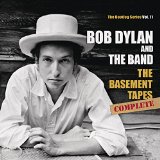 Release of Bob Dylan’s complete “Basement Tapes” Read more
Release of Bob Dylan’s complete “Basement Tapes” Read more


